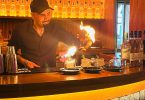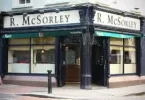Some pubs and bars struggle to remain open – Fáilte Ireland

Fáilte Ireland found that 90% of pubs & bars currently recruiting are experiencing difficulties and among those, 84% struggle to find bar staff.
“Whilst locals are not tourists and therefore not directly relevant to tourism research” argues Fáilte Ireland’s Tourism Barometer, “if the lack of locals going out to pubs & bars causes businesses to close, the tourism offering declines too.”
For the latest Barometer the Irish tourism body designed a questionnaire (set up online by Strategic Research and Insight, an independent research agency) and distributed the survey link to its trade database on the 10th of May this year.
Of the 732 individual responses, pubs and bars comprised some 104 of them.
Fáilte Ireland found that 90% of pubs & bars currently recruiting are experiencing difficulties and among those, 84% struggle to find bar staff.
While most businesses are back open, only 30% of them are operating at full capacity or have more domestic visitors to date this year compared to a ‘normal’ pre-Covid year while 30% have had the same level. The rest – 40% – have seen a decrease and as things stand, the tourism industry will still be relying on the domestic market for bookings this Summer.
The proportion of those recruiting staff is particularly high among those in the Restaurant sector at 92% and Hotels at 95%. This difficulty in recruitment is consistent across all sectors and regions but is especially high among restaurants & cafés.
While nine in 10 businesses recruiting staff are finding it hard, in trying to address the recruitment challenges most employers are taking action: 71% of those recruiting are increasing pay, 69% are offering more flexible work patterns and 64% are offering more predictable work schedules.
Rising costs are the top concern
The most commonly cited causes for concern this year are rising energy costs (82%) and operating costs besides energy (78%). This gives operators the dilemma of putting up prices to levels that visitors can’t afford or would see as poor value for money, or maintaining prices, which is not sustainable, points out the survey.
Roles in the Food & Drink sector have proved to be the hardest hit and roles which involve the preparation or service of food & drink stand out as being particularly hard to fill. This is consistent with Fáilte Ireland’s Trade skills needs survey last year.
Most restaurants (86%) and hotels (82%) with recruitment difficulties struggle to find chefs while waiters/waitresses are hard to recruit for businesses that need them the most – 81% of restaurants & cafes with recruitment difficulties struggle to find them.
In responding to the question “For which of the following roles have you had difficulties recruiting?” 57% of those experiencing difficulties in recruitment answered “chefs/culinary” while 51% responded “waiters/waitresses” and 46% responded “bar service”.

46% of respondents found difficulties in recruiting bar staff.
According to the Barometer survey, “Employers say they’re trying to address the issues – in fact those experiencing recruitment difficulties are much more likely to be making positive changes than those not experiencing difficulties”.
For example, 76% of employers experiencing difficulties have increased pay compared to 49% of those not experiencing difficulties.
Last year’s On the job worker’s survey revealed many factors which deterred workers from the tourism & hospitality sector. These factors formed the basis of the question in this survey which asked of those businesses recruiting (with or without difficulty): “Have you offered/do you intend to offer any of the following to attract new staff compared to employment terms previously offered?”:
This question elicited the following response:
Yes No Too soon to say
Increased pay 71% 15% 14%
More flexible work patterns 69% 16% 15%
More predictable work schedules
and/or guaranteed shifts 64% 20% 16%
Improvements to working environment 56% 26% 18%
More opportunities for career progression 51% 28% 21%
Improved non-pay benefits 43% 35% 21%
Less unsocial hours 37% 42% 21%
Assistance with further education 37% 43% 20%
Wellness support 34% 43% 23%
The need for increased pay
The need for increased pay to take on the kind of lifestyle that the tourism & hospitality industry often requires was one of the key findings from last year’s research.
The majority of businesses who’re experiencing difficulties in nearly every sector say they’re increasing pay but some say even this is not enough to fill positions.
One Galway pub is “offering chefs considerably more pay than we would have been paying for the same qualifications three years ago”.
More flexibility/less unsocial hours
Another key finding from last year’s research was the deterrent of working lots of unsocial hours with little choice in the matter. Some employers now say they’re trying to address this – actions include a four-day working week, a reduction in business opening and more flexibility given to employees to say which hours they can and can’t work.
Non-pay benefits
Last year’s research also showed that some workers perceived the non-pay benefits to be better in other sectors. Some tourism employers are trying hard to provide for their staff in this way, especially by providing accommodation. Some of the non-pay benefits include free or discounted services offered by the business (eg meals, leisure facilities).
One Limerick pub has introduced “Democratic decision-making, keeping everyone informed of all business information, staff discounts, empowering all employees by providing everything they need to do their job, casual transparent authentic environment, acknowledging employee feedback on an ongoing basis”.
Effects of recruitment difficulties
Indeed Ireland’s tourism offering remains at risk.
The recruitment difficulties are having an impact on people working in the industry, with 83% saying that it’s causing added stress.
The impact is also seen on customer experience (74%) and reducing capacity or trading hours (72%).
The Barometer survey asked those experiencing difficulties in recruiting “What impact would it have on your business if you’re unable to find the find staff?”:
- Added stress 83%
- Negative impact on customer experience 74%
- Have to reduce capacity, service or trading hours 72%
- Extra hours for existing staff 64%
- Have to train new staff with limited skills or experience 59%
- Have to employ agency staff 20%
- Closure 16%
- Other 1%
Reasons to be positive
In spite of recruitment challenges and other causes for concern there are many reasons to be positive this year.
The pandemic is finally subsiding, allowing businesses to be confident about remaining open and welcoming back overseas visitors.
Survey respondents were asked, “Are there any particular reasons to be positive about business this year?”
- Pandemic subsiding 58%
- Return of overseas visitors 58%
- Repeat visitors 51%
- Irish people holidaying in Ireland 40%
- Own investment in the business 38%
- Own marketing 33%
- Local festivals/events 27%
- Marketing by tourist boards 26%
- Improved amenities in my area 21%
- Improved visitor attractions locally 15%
- Weather 10%
- New tourism product in my area 8%
- Other 1%
- There’s nothing to be positive about 1%
Causes for concern
When respondents were asked, “Are there any particular causes for concern regarding business this year?” rising costs were a top concern. While Covid might have plagued the industry severely for two years and might resurge in future, concerns are more dominated by rising costs.
- Rising energy costs 82%
- Rising operating costs besides energy 78%
- War in Europe 64%
- People lacking disposable income 51%
- If Covid resurges 51%
- If Irish start going abroad again 43%
- Can’t get the staff 43%
- Fewer hospitality businesses open 18%
- Lack of availability of car hire 13%
- Weather 13%
- Competition 11%
- Deterioration in local amenities 10%
- Perception of security in my area 4%
- Other 3%
- Nothing to be concerned about 1%
Effects of rising costs
Soaring prices of energy and operating costs in general present businesses with a dilemma. They can put their prices up to cover this – but this could make them uncompetitive (compared to consumers going abroad), make visitors feel like they’ve received poor value-for-money and visitors may not be able to afford it anyway because they’re also feeling the pinch. Alternatively they can keep their prices the same – but this is not sustainable.
According to one bar in Clare, “The local hotels are accommodating Ukrainians and therefore restricting regular holidaymakers to the area who would probably experience my bar”.
Lasst May Fáilte Ireland had estimated some 40,000 vacancies across the sector and launched a €700,000 marketing drive to address staff shortages.
A major element of Fáilte Ireland’s work plan for 2022 is a multifaceted tourism careers strategy to address the staffing and skills crisis in tourism and hospitality including the first-ever Excellent Employer Programme to support tourism and hospitality businesses to demonstrate their commitment to being rewarding and appealing workplaces that can compete for and retain skilled employees.
Fáilte Ireland’s plans aim to continue to drive domestic demand through a €10 million domestic marketing investment.

A major element of Fáilte Ireland’s work plan for 2022 is a multifaceted tourism careers strategy to address the staffing and skills crisis in tourism and hospitality.








